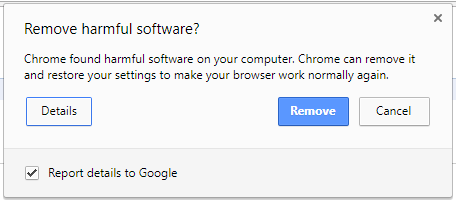Google Adds Antivirus Feature For Chrome Web Browser On Windows PC

Google has announced that it is rolling out a basic antivirus feature for the Chrome web browser for Windows PC. Google Chrome will now be able to detect suspicious or unwanted programs in the user’s Windows PC and give the user the option to remove them in one click.
The first feature that Google has announced actually began rolling out to users last month. Google Chrome on Windows is now able to detect if any of the browser’s settings have been changed without the user’s permission or consent. This typically occurs when users download and install browser extensions for Chrome.
“Extensions can help make Chrome more useful—like by customizing tab management. But some extensions may change your settings without you even realizing it,” Google explained in a blog post.

When Google Chrome detects a setting has been modified without the user’s permission, a pop-up window will appear informing the user that their settings have been altered. Users will have the option to restore their original Chrome settings. Users will only have to click on the “Restore” button in the pop-up window to change back to their original settings.
The second feature that Google is introducing in Chrome for Windows PC is more powerful. Called Chrome Cleanup, the feature acts like a built-in antivirus for the Chrome web browser. Chrome Cleanup works by notifying users when it detects that a harmful software is installed on the user’s PC. A pop-up window will appear when Chrome Cleanup detects any harmful software and provides users the option to remove it from their Windows PC.

Google says that it worked alongside the IT security company ESET to combine their detection engine with Chrome’s sandbox technology. This is what enables Chrome Cleanup to detect any potentially harmful software that’s on the user’s Windows PC.
Although Chrome Cleanup works like an antivirus, Google warns users that it’s not intended to be a general-purpose antivirus. Chrome Cleanup is only able to detect and remove software that doesn’t comply with Google’s unwanted software policy. That said, users should still have a real, standalone antivirus installed on their Windows PCs if they truly want to be protected from major computer viruses and malware. Since Chrome Cleanup will now work inside the Google Chrome web browser, it’s likely that the standalone version of the program will be discontinued.
With Google Chrome beefing up its security features with a more powerful Chrome Cleanup tool, there are worries that the web browser might negatively impact computer performance. As pointed out by Android Police, Google Chrome is a performance hog and is notorious for eating up RAM.
In response to this concern, ESET’s chief technology officer, Juraj Malcho, released the following statement:
“Speed of the scan and minimal performance impact is crucial hence only the most necessary parts of the scanning engine are included, resulting in a pretty tiny product. Also, only selected parts of OS are being scanned as compared to full a blown security solution.
From functionality perspective, it lacks preventive dynamic on-access scanning, i.e. it doesn't monitor the system all the time. The scans are being run periodically and the focus here is on remediation - system cleanup and restoring settings to known good state.”
© Copyright IBTimes 2025. All rights reserved.





















